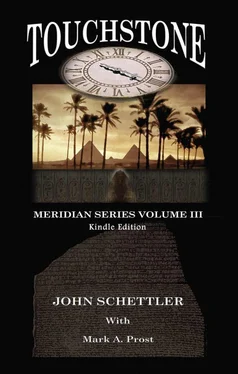“I really don’t know,” said LeGrand. “I was pulled forward and immediately sent into the ready room for a quick briefing. I have no idea what lies beyond these walls, but I know one thing—if any one of us should step beyond the influence of the Arch field, we would immediately be exposed to the full force of Paradox—annihilation may be too strong a word, but perhaps not. Who can say what place you may hold in the Meridian taking shape out there? Who can say if any of you exist there at all?”
Maeve’s hand was shaking. “So you’ve finally done it,” she said with real anger. “It’s just as I feared.”
“On the contrary,” said LeGrand. “This was not our doing. Would we wish such a reversal on ourselves? No—our adversaries have brought this calamity upon us.”
“Just as you did to them on that very first mission, correct?” Maeve held his gaze, and LeGrand took a long breath.
“Yes,” he admitted. “That first mission to the Hejaz worked a transformation. When you prevented the destruction of the second train, you set a new template for all future time. You didn’t notice it in your own lives. The change rippled forward from 1917, but the effects did not gather strength until 2010, the date when Palma was to erupt as a result of the plot hatched by Ra’id Husan al Din. With your help, we stopped that catastrophe from occurring, and then set a watch on that island to secure it against any future tampering. Can you blame us? You, of all people, should understand, Miss Lindford. If the Palma event were not reversed, the whole of Western civilization would have spiraled down into oblivion. We had to act to save ourselves—to save it all—Christendom, Western culture, art, literature, the sciences—all the things you love so dearly—would you rather we left them to the ashes?”
“They were meant to die,” said Paul. “It was all meant to end at Palma, wasn’t it… The world we made possible was never meant to be. And this whole affair, this Time war, was the result of it all. Our adversaries, as you call them, were simply trying to preserve the integrity of the original Meridian, Maeve. I know this has crossed your own mind as well. Look… it’s difficult for us to admit it but, to use an old phrase, we’ve all been living on borrowed time.”
LeGrand looked from one to the other. “It doesn’t have to be that way,” he pleaded. “That’s why I’m here. We’ve one more chance to set things right! We found out what they were doing, you see, only too late to intervene. You were on to it, professor. Your little trip to the British Museum put us on the trail. It was the scroll, you see, the rubbing.”
Nordhausen gave him a penetrating look. “Yes,” he said. “I always did suspect that the image on that scroll was a rubbing. It was clearly not penned in ink or created by any other drawing instrument. I determined that it was a rubbing from a carved stone, just as you say.”
“Well you were quite correct, professor. Why we were so blind to the scheme amazes us even now. We put our faith in technology, and thought our enemies would do the same. We had every confidence that we could best the radicals. We were better at it than they were, and we had the benefit of your original research as well.” He pointed at Paul.
“Imagine our surprise when you took that fall in Wadi Rumm and discovered a working Arch, in the form of a well, that relied on something as deviously simple as an Oklo reaction as its primary power source.” LeGrand’s eyebrows raised over his grey eyes as he hurried along.
“We were winning, you see. They built their own version of the Arch, but we found it, and destroyed it. And each time they built another we destroyed it again, until we were certain we had done them all in. We had them hounded in to the far corners of the world, just like old Osama Bin Ladin from your era. He set the model. He gave up his cell phone and relied on couriers—a decidedly low tech approach to the struggle that proved quite effective. He sat in his cave and remained a thorn in America’s side for years, inspiring a whole generation of new insurgents as your government blundered into one grandiose military action after another.”
“Nothing new in that,” said Robert. “Islam has been guided by so called ‘hidden imams’ for centuries. Whenever the culture comes under stress from external forces, it generates these mythical figures: hidden imams, the Mahdi they believe will emerge to lead them to victory. Then we get Fedayeen warriors rallying to the call of jihad in an almost antibody like reaction against the outside force.”
“If only the leaders of the West understood that,” said LeGrand. “They have no idea how resilient these religious beliefs can be.”
“Glad to see you’ve had a change of heart,” said Maeve, but with little warmth.
“Oh, I can agree that we were wrong with our methods at times,” said LeGrand, “but Western culture was simply too shining a force in the world to be contaminated and destroyed by these radicals. If that meant war—unjust war, I’ll admit—then so be it. Yes, you will be quick to lecture me on imperialism, colonialism and all the other evils that the spread of our culture engendered. But we soon came to the conclusion that empire had its benefits—benefits that outweighed the liabilities.”
“Oh, certainly,” said Maeve. “Empire is wonderful—when you’re a citizen; when you’re on the inside. It’s not so lovely when you are on the receiving end of the bombs.”
“I’ll concede that. But what would you hand me in place of Hiroshima? Would you forgo the bomb if it meant a billion people in Southeast Asia would live under the tyranny of Imperial Japan? And what would you hand me in place of Dresden? Weren’t the concentration camps at Auschwitz enough? Cultures clash, nations struggle with one another in the stream of history, and one side prevails. We’re offering social equities, free markets, capitalism, democracy—”
“Levy Silver,” said Maeve, her arms folded in opposition.
“I don’t understand,” said LeGrand.
“…and some of us were mostly brass under a thin film of gold,” said Maeve. “…A poem I read once. Free markets? Capitalism? Haven’t you studies the history of the financial shenanigans that brought on the second great depression? The problem with all the wonderful things that empire provides is that millions have to die for them. Democracy? Equity? The West is guilty of a thousand felonies on that count, monsieur LeGrand.”
“Yes, yes—we went through all this before, didn’t we? But look at the time!” His eyes flashed up at the clock, laden with anxiety and emotion. “We can’t sit here and quibble over the morality of our culture—it’s dying! Yes, that means the poetry you’re so very fond of, my dear—Shakespeare, Milton, Chaucer and all the rest. They don’t exactly resonate with the edicts of Sharia and the Koran! Now please—just hear me out. We’ve come to you again, in our last extreme. The whole thing has come full circle. You chose once, and now you must make a choice again. Will you help us? Because if you do not, then you forfeit the entire heritage of Western culture. Nothing of it will survive this hour if you do not act to save it.”
LeGrand looked from one to another, pleading, and it was Paul who spoke first.
“What is it you have come to ask of us?”
“A mission—from here—just like the first time. This is the first wound in the flow of Time, here and now. No other Arch exists prior to this point on the continuum. They can do what they might in years to come, but from here you can act with impunity. No one else can interfere. Do you understand?”
“Act with impunity—yes, I suppose I do understand. But what would you have us do?”
Читать дальше












